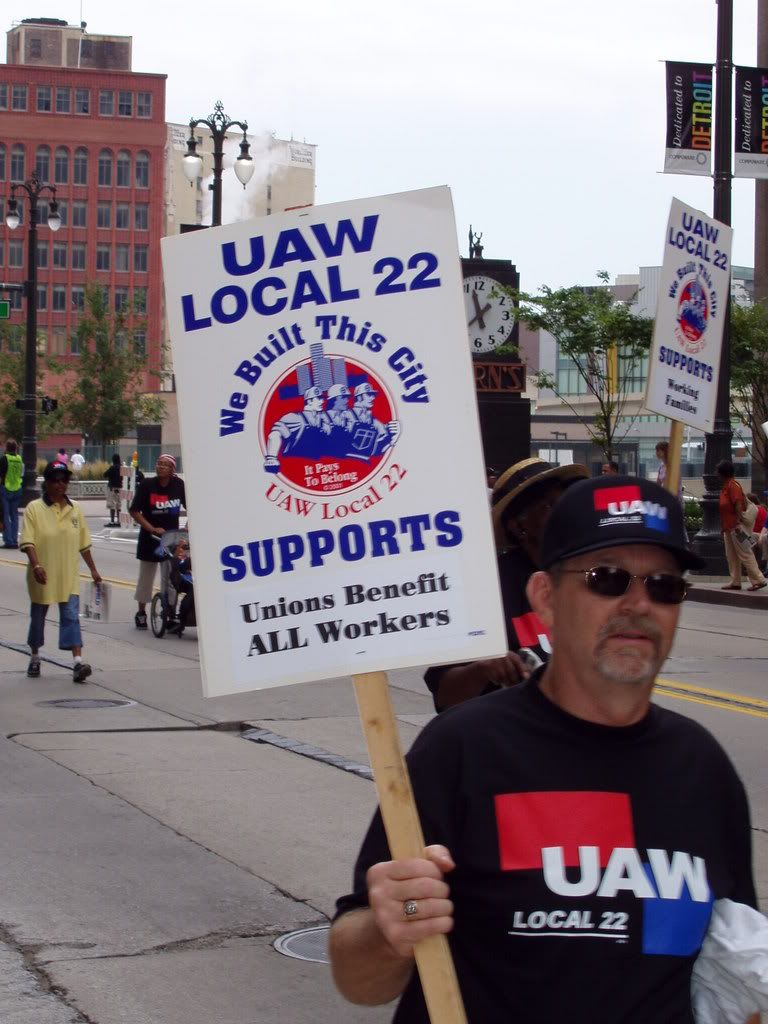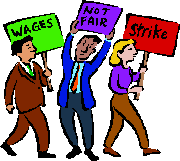
By Scott Marshall
The wages and working conditions of union autoworkers have always set standards for all manufacturing. These in turn have put upward pressure on wages and benefits for all workers. But in today’s political and economic climate, major contract negotiations in the manufacturing sector are hell. Thirty years of corporate/right-wing attack on labor law and workers’ rights have taken an enormous toll. Capitalist globalization, with its frenzied export of capital and jobs, has greatly weakened union leverage. In 1979 General Motors employed over 400,000 autoworkers in the U.S.; today that number is less than 80,000 and shrinking. US autoworkers productivity is higher here than any where else in the world. Labor cost is about 10% of the cost of a vehicle. About 25% of the auto workers in the US are in unions. Thirty years ago labor was about 25% of the cost and 90% of the assembly workers were in the union. Add in the environment of corporate greed, fraud, flimflam and corruption evidenced on Wall Street in the current mortgage and financial crisis, and you have essential context for evaluating the GM/United Auto Workers settlement.
The good
When over 73,000 UAW workers walked out last month in the first national strike against General Motors in over 30 years, they showed courage, militancy and spirit. Within minutes, spontaneous solidarity erupted across a broad section of labor and the working class. The Teamsters stopped moving parts, and that led to quickly closing plants in Canada and Mexico. Caravans of supporters, other unions and just folks showed up on picket lines bearing refreshments and support. The AFL-CIO, Change to Win and major unions responded with pledges of support. This was not just trade union solidarity. Everyone in labor, and many beyond, knew that the GM workers were on the front line for us all, and were ready to back them up.
The mostly bad
The GM contract is a setback for autoworkers and for the entire U.S. working class. Its worst feature is a two-tier employment system that will mean new hires will get about half the wages of senior workers, and worse benefits. With huge cash buyouts of current workers and the expected retirement of about a third of current workers in the next five years, the second tier could become the main tier by the end of the contract. This is a real sharp setback for younger workers who will soon be the majority. What kids will want to follow their parents into auto for half the wages and fewer benefits?
The disunity and the unfairness of it all has great potential to weaken the union even further, especially on the shop floor. Further, union auto jobs have been an important path out of poverty for African American, Latino and women workers in particular. A two-tier system will greatly undermine this kind of opportunity.
The health care part of the agreement also has great dangers. It shifts responsibility off of GM and onto the union. This sets the workers up for crisis. Recession, stock market crashes and rising costs can leave the workers with greatly increased costs or totally uninsured. Not to mention the problems of the union being a “player” on Wall Street – talk about conflicts of interest! Letting this giant international corporation renege on its health care responsibilities will certainly lead both union and nonunion companies along the same path.
These kinds of concessions from the union will make it hard to organize new members.
The UAW leadership has underestimated the union’s strength and its members’ readiness for a fight. At the same time it has overestimated GM’s real vulnerabilities. The U.S. auto market is still essential to GM. Unfortunately, this agreement follows a long established pattern of assuming that it is better to “go along to get along.” For the last 25 years, concession contracts have claimed to provide job security. But as soon as the job “guarantee” is signed, GM and the other auto companies start whittling away for the next contract. Keeping promises to workers is not part of their creed. As UAW President Ron Gettlefinger said, the workers can’t give enough and the company can’t take enough.
The race to the bottom never stops, so autoworkers need to get off that bus. Keeping GM “competitive” is just yada-yada for “keep GM profits up and let the workers bear the costs.” Stopping this GM drive requires the power of the membership. That has to be prepared and mobilized. It requires reaching out to all of labor and the working class, not pursuing a go-it-alone strategy.
It should be clear to all that the failed strategy and tactics of struggle in the auto industry of the last 30 years will not work today. New strategy and tactics have to be based on the very new conditions of a globalized auto industry. They also have to be based on the reality that so much of the U.S. auto industry is unorganized. The power of a union is its members and its numbers. And increasingly, that power is in global labor alliances that can match global giants like GM. Labor’s power is not measured only by the wisdom and determination of its leaders, but real leadership wisdom and determination is required to win in this new world.
A good idea
By all accounts it was GM’s resistance to the union’s demand that it invest in U.S. plants to guarantee jobs that forced the strike. Trying to force GM to commit to and expand its domestic operations opens an important front of struggle. GM’s capital comes from the hard work of generations of autoworkers. The workers very much need to challenge GM’s “right” to invest where it pleases with no responsibility to the people and communities who made all that capital. Unfortunately, the contract gives GM a loophole, saying “market-related volume decline” will guide plant closings and U.S. investment. Hopefully the contract will keep jobs and investments here, but GM should not be allowed to make those decisions alone.
The ugly
Wall Street’s clamor for autoworkers’ blood was truly ugly. It went the gamut from praising GM for finally (sic) getting tough with the union to the mad rant by MSNBC’s Jim Cramer for GM to “break the union.” After the tentative agreement was announced, Wall Street started yammering that the concessions weren’t enough. The ugly, naked hatred of these finance capital pundits is scary to behold. Gone is the pretense of wanting class partnership. Gone is any pretense of fairness or justice.
The struggle continues
This fight isn’t over by a long shot. Ford and Chrysler contracts are still pending and could result in more picket lines. Labor and all progressive movements have to continue to build support for this fight. Even at GM, where it seems certain that the contract will be ratified, the fight will continue.
But ultimately, those of us who understand the broader working class nature of this fight have to redouble our political efforts on issues central to these negotiations. The 2006 election victories against the right-wing Republicans, the energy of the autoworkers in their strike and the determination of labor and progressives to shift power even more in the 2008 elections – these are exciting indications that what autoworkers have lost at the bargaining table can be won in the political arena.
Every candidate for Congress and the presidency needs to be pushed to take a stand on single-payer national health care, on passing the Employee Free Choice Act (there is leverage in having Mercedes, Toyota, BMW, and Honda workers in the UAW) and on industrial policy that mandates re-investment in the manufacturing base of our economy. The autoworkers’ fight is our fight! They have to win so we can win.
Scott Marshall (scott@rednet.org) is chair of the Communist Party USA’s labor commission. Read the CPUSA Labor Commission Blog at: http://laborupfront.blogspot.com/ Photo credit: Melissa O'Rourke




